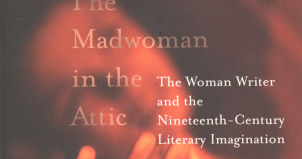To London, with Love: This is a Woman’s World
Ivan Lett—
 Typically I reserve this space for books acquired through our London office, but my subject here is largely still about England, all the same. In fact, much of the literature discussed in The Madwoman in the Attic: The Woman Writer and the Nineteenth-Century Literary Imagination, by Sandra Gilbert and Susan Gubar, focuses on English writers: Mary Shelley, Elizabeth Barrett Browning, George Eliot; and I’ll admit a certain bias for favorites like Jane Austen, the Brontë sisters, Mrs. Gaskell. I first read the book as a junior in college, and it was one of those course-of-study- and perspective-changing texts. At a time when feminist, racial, queer, and a myriad of other multicultural studies and politics were rapidly populating scholarly discourse, this 1979 study combined several conversations into one, with a clarity that is continually referenced.
Typically I reserve this space for books acquired through our London office, but my subject here is largely still about England, all the same. In fact, much of the literature discussed in The Madwoman in the Attic: The Woman Writer and the Nineteenth-Century Literary Imagination, by Sandra Gilbert and Susan Gubar, focuses on English writers: Mary Shelley, Elizabeth Barrett Browning, George Eliot; and I’ll admit a certain bias for favorites like Jane Austen, the Brontë sisters, Mrs. Gaskell. I first read the book as a junior in college, and it was one of those course-of-study- and perspective-changing texts. At a time when feminist, racial, queer, and a myriad of other multicultural studies and politics were rapidly populating scholarly discourse, this 1979 study combined several conversations into one, with a clarity that is continually referenced.
Gilbert and Gubar inspect literature and literary voice in a manner that ties together a long history of criticism and how women writers of the nineteenth century and afterwards have participated in the creation of an important and preceding feminist culture: “If a brief backward glance at the early stages of feminist criticism establishes its vital origins in the Victorian period…the nineteenth century continues to provide a lively field of activity for feminist thinking that has undergone a series of dramatic methodological transformations,” Gubar writes.In an age where “the humanities in general…have lately been increasingly feminized, both literally and figuratively” writes Gilbert in 2000:
Literally: the membership of the Modern Language Association is now about 50 percent women, and graudate students in many departments are overwhelmingly female. Figuratively: if the sciences are hard and we are soft, that’s at least in part because we do the genteel, wifely job of acculturation and socialization on campus, while the guys in astrophysics shoot for Mars. No wonder, then, that in a world where the richly rewarded scientists speak a host of hard-to-acquire, difficult, private language,s we humble, formerly plain-speaking humanists have yearned for sole access to a similarly difficult private discourse–a jargon, as it were, of our own, which would offer acolytes in our field the same kind of linguistic mastery that bespeaks professionalism in, say, microbiologists and geologists.
Previously I’ve admitted that I’m a lapsed geneticist, so I’d definitely recommend this book for anyone switching sides. And given the female dominance of nearly all levels of higher education today, please do give the idea some thought. You know a book is of the “groundbreaking” sort when another one with [Title] after __ Years (Gilbert and Gubar’s ‘The Madwoman in the Attic’ after Thirty Years, University of Missouri Press) comes out, and with the still-changing picture of women, literature, politics, and self-expression within patriarchal culture, it’s easily conceivable that another in the same vein would appear in the years ahead.
As one of those pristine book owners, I never write on the pages, always keeping my notes elsewhere; or, promising myself that I will remember, which inevitably leads to re-reading. I went to graduate school thinking that an e-reader would be an indispensable tool for keeping notes, passages of interest, not to mention clearing up the scores of printed articles and presentation handouts being carried from one place to the next. With the newly available eBook edition of The Madwoman, I get to have my shelf copy and a new one to digitally dirty up with thoughts of books I’ve read since, all the new Austen film jokes to be made.
Tomorrow at the annual National Book Critics Circle awards ceremony, Gilbert and Gubar will be awarded the Ivan Sandrof Lifetime Achievement Award. As the publisher of not only The Madwoman, but Gilbert and Gubar‘s sequel volumes of No Man’s Land, Yale University Press admirably extends its congratulations to these two women who have contributed vastly to their field.
Ivan Lett is Online Marketing Manager for Yale University Press.




